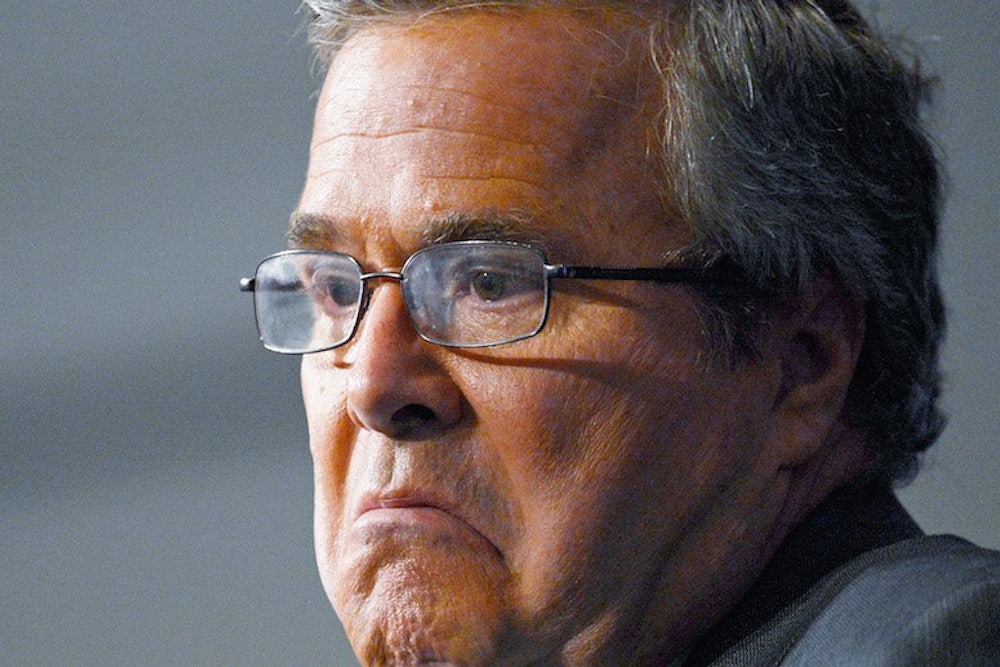Jeb Bush’s instantly controversial argument to the editorial board of the New Hampshire Union Leader—that “people need to work longer hours” if the U.S. economy is to attain perpetually high economic growth—has created a great deal of confusion, when the real implications of his view are clear and troubling.
Part of the confusion stems from the fact that it’s politically dumb to suggest, even unintentionally, that voters don’t work hard enough. Democrats and the political press are treating Bush’s statement as a gaffe, because his words can be plausibly construed to mean just that. The rest stems from the muddled context of his remarks, and his equally muddled attempt to clarify them. Both sets of comments betray a shaky grasp of basic economic terms. But the key difference between them is that in round one, Bush said people “need” to work more, whereas in round two he said people should be given “a chance” to work more. This is a real and crucial distinction—a true walkback, rather than some weaselly attempt to say the same thing using softer language. The problem is that there are plenty of reasons to suspect Bush was being more forthright in the first instance. It’s quite clear, when you examine Bush's past statements and conservative orthodoxy more generally that Bush doesn’t merely want to use carrots to encourage work—he wants to use sticks as well.
Bush’s improbable goal is to make four percent annual economic growth normal rather than extraordinary. Both sets of comments speak to meeting that objective, and he reasons, quite sensibly, that it won’t happen unless people who aren’t currently working begin to work, and people who are currently working begin to work more.
The real controversy arises not from the bloodlessness of the words he chose, but from the tactics he would use to extract the necessary labor.
One way to increase hours worked is to eliminate laws and regulations that make it difficult for people to work as much as they’d like. If the government effectively penalizes employers for giving their workers more hours, or if workers face steep marginal tax penalties when they climb the income scale, then removing those obstacles would give people so inclined “a chance” to work more.
Another way to increase hours worked is to eliminate laws that give workers leverage over their employers. Supplement people’s incomes, and they have less incentive to work. Take away their benefits, and they’ll have little choice but to work more. They will “need” to.
The Affordable Care Act creates both kinds of work disincentives. Under the ACA, workers with subsidized insurance stand to lose hundreds and hundreds of dollars in premium subsidies when their incomes climb from 199 percent of the poverty line to 201 percent of the poverty line. But the ACA also creates a coverage guarantee, which means people no longer need to be so reliant on their employers for health insurance. This is a good thing. It will allow hundreds of thousands of people to leave jobs they don’t want to pursue other interests (startups, full-time parenting, retirement, leisure) without assuming the terrifying risk of medical bankruptcy. But conservatives, including Jeb Bush, think it’s terrible.
Bush doesn’t just support removing burdens that hinder people who want to work more. He supports steepening the costs and risks for people who don’t. If Bush can use economic policy as a cattle prod to hasten four percent growth, he will. When he said “people need to work longer hours” he meant our policies should leave people little choice but to do so. If Bush suffers politically for this, it will be because his words can be made to seem condescending. Workers don’t feel like they “need” to work more, and don’t like being told otherwise by a rich and powerful politician. That’s what political commentators are getting at when they call this a gaffe, but it was only a gaffe in that it revealed a truth he didn’t intend to reveal. The real reason his remarks are troubling isn’t that he meant to call workers lazy—he probably didn’t—but that he wants to make workers feel like working more is their only option.
